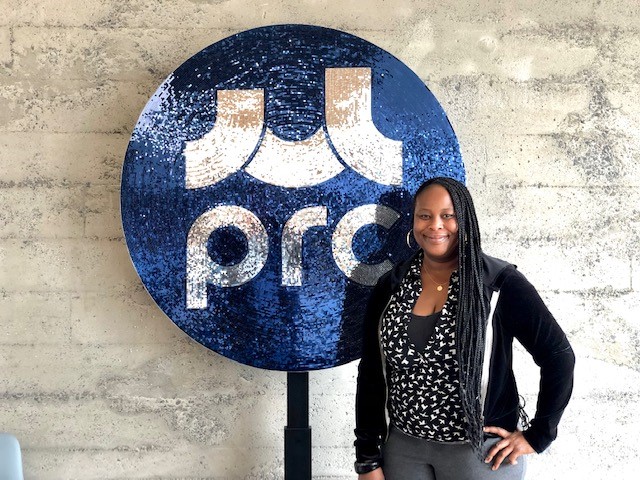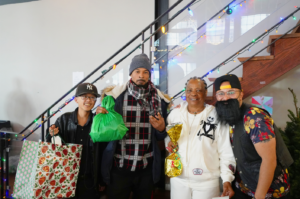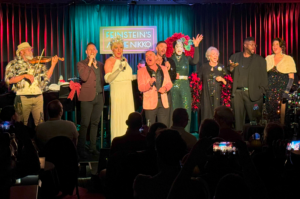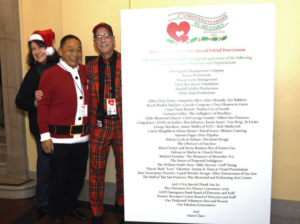Alisa Jackson, An Advocate for All!

“I get to see clients grow, access benefits, find housing, and become stable. It’s been really gratifying to work for PRC this long.”
For many of PRC’s clients, Alisa Jackson is the first person they interact with on their quest for support. Having advocated for herself and countless others for nearly two decades, she’s appropriately earned the nickname Queen Bee of the legal team. She’s the go-to person when anyone has a question, and she does it all with compassion and a warm welcoming smile.
A true San Francisco native, Alisa was raised in the Bayview and later in Pacifica, the result of her grandparents moving her family to the Bay Area from North Carolina in the 1960s. Following her roots, Alisa studied at the University of North Carolina but returned to San Francisco to pursue an additional degree in Paralegal Studies. Today Alisa lives in Oakland with her nine-year-old son, who shares her passion for philanthropy and social justice. Prior to the pandemic, Alisa and her “little buddy”, as she calls her son, were highly active in community service, delivering fresh produce from a friend’s co-op to the homeless encampments in East Oakland. When the world transitioned to working from home, her son got to witness Alisa working with clients firsthand. Since then, he has become an advocate in his own right in being respectful of people’s correct pronouns and does not hesitate to speak up and protect his friends. To Alisa and her son, no one is a stranger, and everyone is a friend.
What brought you to PRC?
“While I was in college, I noticed that there weren’t many services in North Carolina, and I wanted to get involved. The variety of services in San Francisco was another aspect that stood out to me. I decided that if there’s a way for me to be involved in the services that are helping my community, then I can also share this knowledge with friends and family members outside of San Francisco. With this information at my disposal, I can say: these are the resources that are out there. You may not have them in your state but in San Francisco, we have everything, so let me help you to navigate and find those resources in your community.
“Initially, my plan was to go to law school. I volunteered at the Eviction Defense Collaborative and thought, before I go to law school, I should find a job in the field and make sure this is what I want to do. I completed my paralegal certificate at City College and began looking for work at a nonprofit. PRC’s mission really spoke to me. I liked the idea of helping people who are HIV positive or living with mental health struggles. At that time, people with HIV weren’t living as long. The mission is close to my heart because I have family members who have passed away from HIV. When I saw the posting for PRC, I thought, that sounds like something I can do. I decided to pursue more of a legal assistant role and try to earn some money before acquiring law school debt. I’ve done really well utilizing the skills I earned with my paralegal certificate, but law school is still on the table in the near future.”
Can you describe your role as the Supervising Legal Assistant?
“Essentially I’m the go-to resource for all the different departments. I supervise a total of five legal assistants, and I work closely with the supervising attorneys and the managing legal director. I’m the gatekeeper because I navigate the calls that come in. Whether clients need help with social security, health care, or other legal needs, those calls come to me. I have a plethora of knowledge regarding PRC and the community members that we work with. My function is to support the attorneys in their role with helping people get their claims approved.“
How long have you been the Supervising Legal Assistant?
“It’s been a solid six years now as the Supervising Legal Assistant. I advocated for a Senior Legal Assistant title by writing a letter explaining why I deserved the promotion after the first six years with PRC. Prior to that, the Senior title didn’t exist. I love my job and I enjoy helping others. I like to think that I help advocate for both staff and clients as well. I advocate for a lot of things. But I don’t try to force my way. I choose my battles. If I feel like something is wrong, I’m going to speak up about it.”
What aspects of your job do you find rewarding?
“Clients who accessed services way back when our offices were located on Market Street are frequently surprised that I’m still here after so many years, and they are always so happy to see me. When I greet our African American clients, I get to see the pride and joy in their faces knowing that someone that looks like them will be representing them. I’m in a position of power and also a position of help. Representation is incredibly important. These types of connections are really special to me.”
There tend to be a lot of stigmas surrounding homelessness and mental health issues. For anyone who holds these feelings, what would you tell them to help change their perspective?
“I was raised to respect all people, no matter what. There’s a lot of stigma or bias for people of color, African American women, the LGBT communities, or simply being part of certain groups. I say be respectful of all people, no matter what, because at the end of the day, when it comes to being homeless, especially in San Francisco, it can happen to anyone. One day you may lose your job. And you’ll be in the same position. My main objective is to put things in perspective. You never really know what a person has gone through, so be mindful of that.”
For somebody who wants to help out, what’s the best way for them to get involved?
“Find an organization whose mission is dear to your heart and volunteer. There are so many organizations and many of them were created during COVID as people either lost their job or saw that there was a need and wanted to help. Do an online search. Look on Instagram. Find a local organization and volunteer once a week or month. Then spread the word and tell your community: hey, I’m helping such and such organization with a, b, and c, and try to bring friends. Start somewhere close to where you live. That way you’ll be making a direct impact on your local community. And if you have the means, please donate.”
What do you do to combat compassion fatigue?
“I remind myself frequently that it could be me in the client’s shoes. There have been so many times where I’ve had a rough day, then I go to talk to a client, and they tell me that I just made their day. I gave them information that they didn’t know. Then I feel a lot better, and that puts me back on track. Sometimes I get overwhelmed, and then the phone will ring, and I think, should I take it? Then someone will tell me that they’re so thankful and grateful that I took the time to talk to them, and that always reminds me of why I’m here, and it makes it all rewarding.”
You’ve seen PRC grow for nearly 17 years. Do you see a difference in how clients feel coming into our new office building compared to how they felt when they accessed services at the Market Street location?
“Due to COVID, we’re no longer in the office five days a week like we were, but we strive to help as many people as possible. We try our best, and I feel that for the most part, we succeed. For clients who received services at the old building, when they come into our new office and I see the expression on their face, they love it. I hope they see the new building as our commitment to them and providing a comfortable home-like atmosphere where they feel appreciated and valued.”
Is there anything that you feel that our readers should know about the work being done here by you and your colleagues?
“Keep believing in PRC because we’re here for the long run. I know a lot of nonprofits don’t survive, but we’re still here. And there are still a lot of great people coming in and out. We serve San Francisco’s most vulnerable population, and they need your help too. Be kind, give smiles instead of judgment, and do the right thing, even if it’s the harder option. If you can, give back when you are able.”
If you enjoyed getting to know Alisa and the impactful work she does for PRC’s clients, please consider making a donation to support our mission. If you would like to learn more about Legal Advocacy, PRC’s programs, or the wonderful staff at PRC, you can read more stories on our blog or visit our website.



